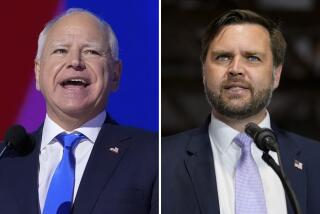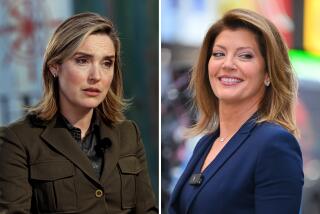6 Candidates Will Have to Deal With Issue on TV Tonight : Stock Crash Puts GOP Debaters on Spot
- Share via
WASHINGTON — The stock market crisis has pushed the six Republican presidential candidates who debate tonight in Houston into the spotlight--and put them on the spot.
The two-hour confrontation, which will be broadcast nationally on public television and seen in Los Angeles at 9 p.m. on Channel 28, will be the first debate involving all of the GOP contenders.
Ordinarily, such an event fully three months before the first Republican convention delegates are chosen, would stir little more than curiosity among the citizenry. But the turmoil in the financial markets, with its potentially far-reaching implications for the rest of the economy, has brought an element of urgency to this debate, the first major campaign event in either party since last week’s record plunge in the stock markets.
After Reagan, What?
“The timing of this debate has turned out to be perfect,” said Republican pollster Linda DiVall, who is not affiliated with any of the six contenders. In view of the continuing upheaval on Wall Street, she said, “what people want to know now is what happens after Reagan.”
As the front-runner in the GOP contest, Vice President George Bush probably will get the bulk of the attention at the start. But Peter Teeley, communications director for the vice president’s campaign, said: “This is not only an opportunity for Bush but for all the other candidates, too.”
They are Kansas Sen. Bob Dole, former Delaware Gov. Pierre S. (Pete) du Pont IV, former Secretary of State Alexander M. Haig Jr., New York Rep. Jack Kemp and former television evangelist Pat Robertson.
Teeley acknowledged, though, that exploiting the opportunity will not be easy. “All of them will have to deal with the stock market crash carefully and rationally,” he said. “It increases the pressure to sound knowledgeable and to present reasoned proposals.”
Republicans on Defensive
To complicate their task, all of the Republicans in a sense seem to be on the defensive, at least for the time being, because many Democrats have been quick to blame President Reagan’s policies for the debacle on Wall Street.
Under the circumstances, Republican National Chairman Frank J. Fahrenkopf Jr. has suggested to the candidates that the best defense is a good offense. Fahrenkopf, complaining that “the Democrats have been unfairly beating up on Republicans,” said he had reminded the Republican debaters that the Democrats, too, are open to criticism on economic policy on such issues as trade and taxes.
“I would hope that they would point out that protectionism and tax increases are not conducive to economic health,” Fahrenkopf said.
If the Republicans do lash out at the opposition party, they will only be following the example set by the Democrats last July in their first campaign debate, which, like tonight’s GOP encounter, was a special edition of William F. Buckley’s “Firing Line” interview show, with Buckley and former Democratic National Chairman Robert S. Strauss as interrogators.
In addition, Fahrenkopf predicted, the Republicans are bound to spend a considerable amount of time “staking out their own turf” and taking pot shots at one another.
Bush a Likely Target
In this skirmishing, Bush is the most obvious target because of his lead in the polls. His rivals note also that the vice president has had some unhappy experiences in prior debates. In a critical debate in Nashua, N. H., before the 1980 election, Bush was outmaneuvered and dominated by Reagan, just about dooming his hopes of besting Reagan for the GOP nomination. And, in his 1984 debate against Democratic vice presidential candidate Geraldine A. Ferraro, many people thought that Bush seemed disjointed and tense.
Dole has had similar problems. Critics contend that he was too harsh in his vice presidential campaign debate in 1976 against Walter F. Mondale and suggest that there is an unpleasant side to Dole’s personality that will emerge under television lights.
But David Keene, Dole’s senior campaign consultant, said that he welcomes the greater scrutiny that the debate will bring. “If you are going to win the nomination, at some point you have to expect this,” Keene said.
Keene conceded that a potential problem for sharp-tongued and sometimes quick-tempered Dole is that the other candidates “could get under his skin.”
Keene added: “The one thing that would hurt Dole is if he started looking like an attack dog.”
Some analysts believe that Kemp enters the debate with one strike against him because of his close ties to the economic theories underlying Reaganomics. “Supply-siders are going to have a problem” because of the slump in stocks, pollster DiVall said.
Sees Boost for Kemp
But Jeff Bell, Kemp’s campaign coordinator, contends that the concern about Wall Street is a boost to his cause because Kemp’s interest in “fundamental reforms” will suit the public mood of discontent with current conditions.
“He’s change-oriented,” Bell said. “I think people are looking for stability when things are going well. When it looks like things might be broken, people look for something different.”
For Du Pont, who has been having trouble making headway against his better-known rivals, the debate represents a “terrific opportunity to allow us to make a distinction” on economic and other policies, campaign manager Robert Perkins said. “Before tax cuts and economic growth were popular, he was doing it in Delaware.”
Robertson aides see the debate as a boost to his efforts to broaden his support outside the constituency he has developed over the years through his televised preaching. “He’s going to be a little aggressive,” campaign communications director Connie Snapp said.
‘Whole New Race’
Advisers to another long shot, Haig, regard the debate, in the wake of the Wall Street crash, as a watershed in the campaign.
“It’s a whole new race,” Haig spokesman Dan Mariaschin said. “Our approach will be to take economic policy and lay out, within the confines of a 90-second answer, where he differs from the other candidates and what he proposes to do.”
More to Read
Get the L.A. Times Politics newsletter
Deeply reported insights into legislation, politics and policy from Sacramento, Washington and beyond. In your inbox twice per week.
You may occasionally receive promotional content from the Los Angeles Times.










